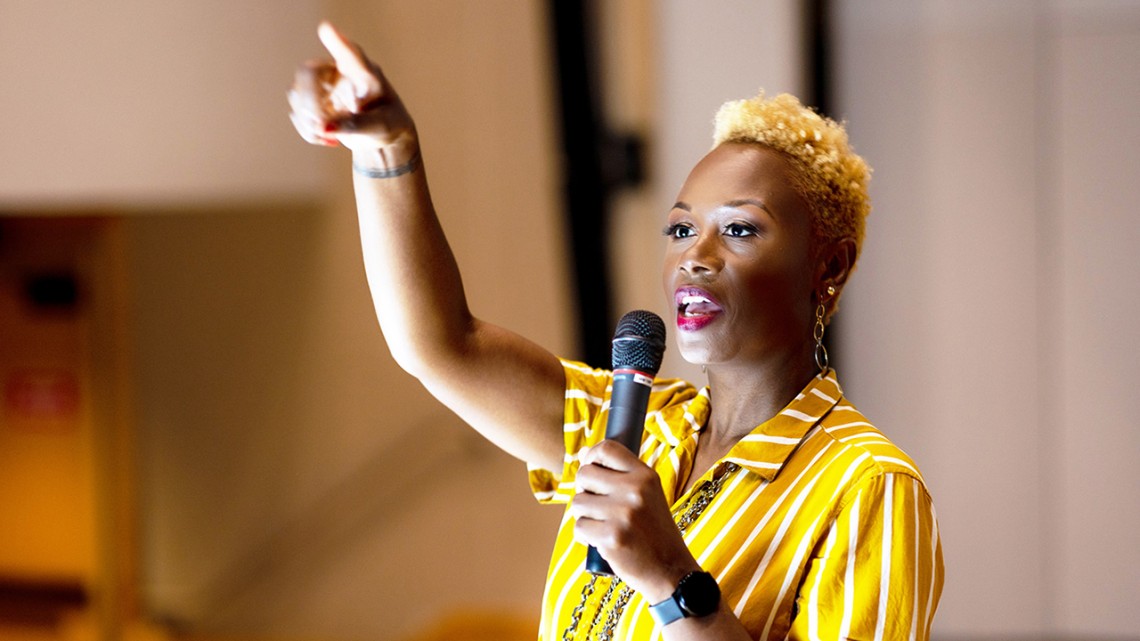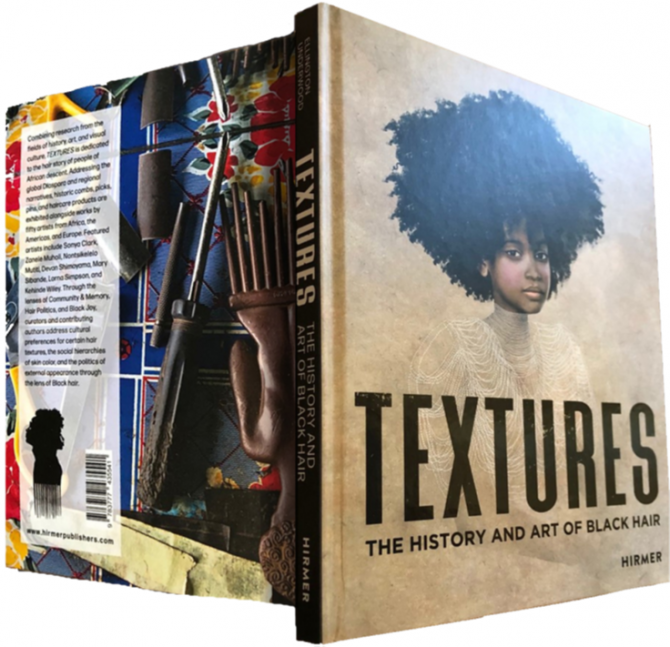
Tameka Ellington, former assistant dean for the College of the Arts and associate professor at the School of Fashion at Kent State University, speaks about the "TEXTURES" exhibit. Ellington presented a lecture at Cornell University as part of the "Fashion & Social Justice" lecture series.
News directly from Cornell's colleges and centers
“TEXTURES” lecture celebrates the history and art of Black hair
By Ayesha Chari
Sonia Clark’s “Black Hair Flag” is a striking image. The four-foot-tall cloth art piece is painted with the infamous flag of the Confederacy — but stitched into its fabric are the traditional African American hairstyles of the bantu knot and the cornrow, which make up the stars and stripes of the American flag. The piece captures the pain and joy of the African American experience in the building of our nation.
The juxtaposition in Clark’s art resonated with Tameka Ellington, former assistant dean for the College of the Arts and associate professor at the School of Fashion at Kent State University. “It’s saying that Black people are the reason that our country is so stable, so this country is our country,” Ellington explained.
The “Black Hair Flag” was one of the many art pieces explored in Ellington’s talk “TEXTURES: the history and art of Black hair” on Sept. 3. The seminar was co-sponsored by Tasha Lewis, associate professor in the Department of Fiber Science & Apparel Design, and was part of the “Fashion & Social Justice” lecture series.
Ellington presented the lecture at Cornell University’s College of Human Ecology in advance of the Sept. 10 opening of her new exhibition, also called “TEXTURES,” at the Kent State University Museum. The exhibit synthesizes research in history, fashion, art and visual culture to reassess the “hair story” of peoples of African descent and features combs, products and implements alongside works by artists including James Van Der Zee, Sonya Clark and Lorna Simpson. It’s broken into three sections: community and memory, hair politics and Black joy.
“I wanted to deconstruct the idea of what Black hair means to our society,” Ellington explained.
Ellington said she was motivated to create the exhibit after studying the traumas Black women face with forced assimilation of the White/Western standards of beauty, such as hair straightening and skin lightening. This ranges from the financial costs and time spent at the salon to health effects like alopecia, or the breakage of hair from constant chemical alteration. The concept of “good hair” being hair that is straighter leads to what Ellington coined “texturism,” or the idea that Back people with straighter hair are more beautiful, more approachable, more intelligent, etc.
However, Ellington did not want to showcase Black hair as solely a source of pain. In order to celebrate Black hair in all its dimensions, Ellington and her co-curator, Joseph Underwood, categorized “TEXTURES” into three sections.
The first, “Community and Memory,” is an homage to the relationship-building nature of hair care. This section includes artifacts such as an Ancient Egyptian figure of two women combing the hair of a child and Annie Lee’s paintings of the Black beauty salon.
The second, “Hair Politics,” features the "Black Hair Flag" alongside an original Angela Davis wanted poster featuring the civil rights activist’s iconic Afro.
And finally, there is “Black Joy,” the section that “celebrates self-love and cultural pride.” Among this collection is a diploma from Poro College, the first Black beauty school, and the tools of Willie Morrow, the inventor of the Afro pick and a friend of many prominent civil rights leaders. It also features modern art that portrays Black hair as a cultural centerpiece and as a wonder of structure and architecture.
“Black hair has been innovative throughout culture,” Ellington said during her lecture. Ellington explained in her talk that the pain and the joy are not mutually exclusive. “TEXTURES” is both a sober acknowledgement of history and a radical ode to one’s natural beauty. As she explained at her talk at Cornell, “TEXTURES” is the celebration of a creativity that has been underappreciated by society for far too long.
Ellington’s talk was cosponsored by Lewis’s Stephen H. Weiss fellowship, as well as the Central New York Humanities Corridor from an award by the Andrew W. Mellon Foundation, the Department of Fiber Science & Apparel Design, the Department of History, The Public History Initiative and the Cornell Fashion + Textile Collection.
Past speakers in the “Fashion & Social Justice” lecture series include Sabrina Strings, associate professor of sociology at the University of California, Irvine; and Abiola Onabule, a London-based fashion designer with a master’s degree in womenswear from Central Saint Martins.
Ayesha Chari ’24 is a student media associate in the College of Human Ecology.
Media Contact
Get Cornell news delivered right to your inbox.
Subscribe

